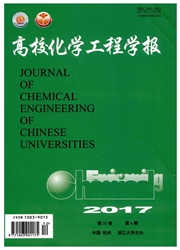

 中文摘要:
中文摘要:
在负载型碳酸钾催化剂上对二氧化碳与1,2-丙二醇(PG)合成碳酸丙烯酯(PC)反应进行了研究。结果表明,负载型碳酸钾催化剂的最佳制备条件为:活性炭为载体,碳酸钾负载量为15%(vt),焙烧温度423.15K。在反应温度443.15K、催化剂用量为2.0%(wt)、溶剂(乙腈)/PG/二氧化碳(摩尔比)为19.2:3:4、二氧化碳初始压力为2.0MPa、反应时间12h的条件下,PG的转化率为12.9%,PC的收率为96%,选择性为74.4%。对活性炭负载碳酸钾催化剂进行了XRD分析,发现存在K2CO3和K2O两种晶相。BET分析结果表明,载体的比表面积对负载型碳酸钾催化剂的催化活性有较大影响。与均相碳酸钾催化剂相比,负载型碳酸钾催化剂上PC的选择性提高了40.3%。
 英文摘要:
英文摘要:
In order to facilitate the separation and recovery of the catalyst used for the synthesis of propylene carbonate (PC) from carbon dioxide and 1,2-propylene glycol(PG), the catalysts of potassium carbonate loaded on different supports were prepared by the incipient impregnating method, and their catalytic properties were studied. The results show that among all the supports studied, activated carbon (AC) is the most appropriate supporter for the supported potassium carbonate catalysts used in the PC synthesis reaction. The optimal preparation conditions of the supported potassium carbonate catalyst are as follows: the loading of the potassium carbonate is 15%(wt), and the calcination temperature is 423.15 K. Under the following reaction conditions: the molar ratio n(acetonitrile): n(PG): n(CO2)=19.2:3:4, reaction time 12 h, reaction temperature 443.15 K, the amount of supported potassium carbonate catalyst used 2.0%(wt) and the initial pressure of CO2 2.0MPa, the yield of PC can be 9.6%, the conversion of PG can reach 12.9% and the selectivity of PC can approach to 74.4%. The X-ray diffraction analysis shows that both K2O and K2CO3 Call be observed in the supported potassium carbonate catalyst, and the BET measurement results suggest that the effect of the specific surface area of the support on the catalytic activity of the supported potassium carbonate catalyst is important. As compared with the unsupported catalysts, the selectivity of PC increases 40.3% when the supported potassium carbonate catalyst is used.
 同期刊论文项目
同期刊论文项目
 同项目期刊论文
同项目期刊论文
 期刊信息
期刊信息
